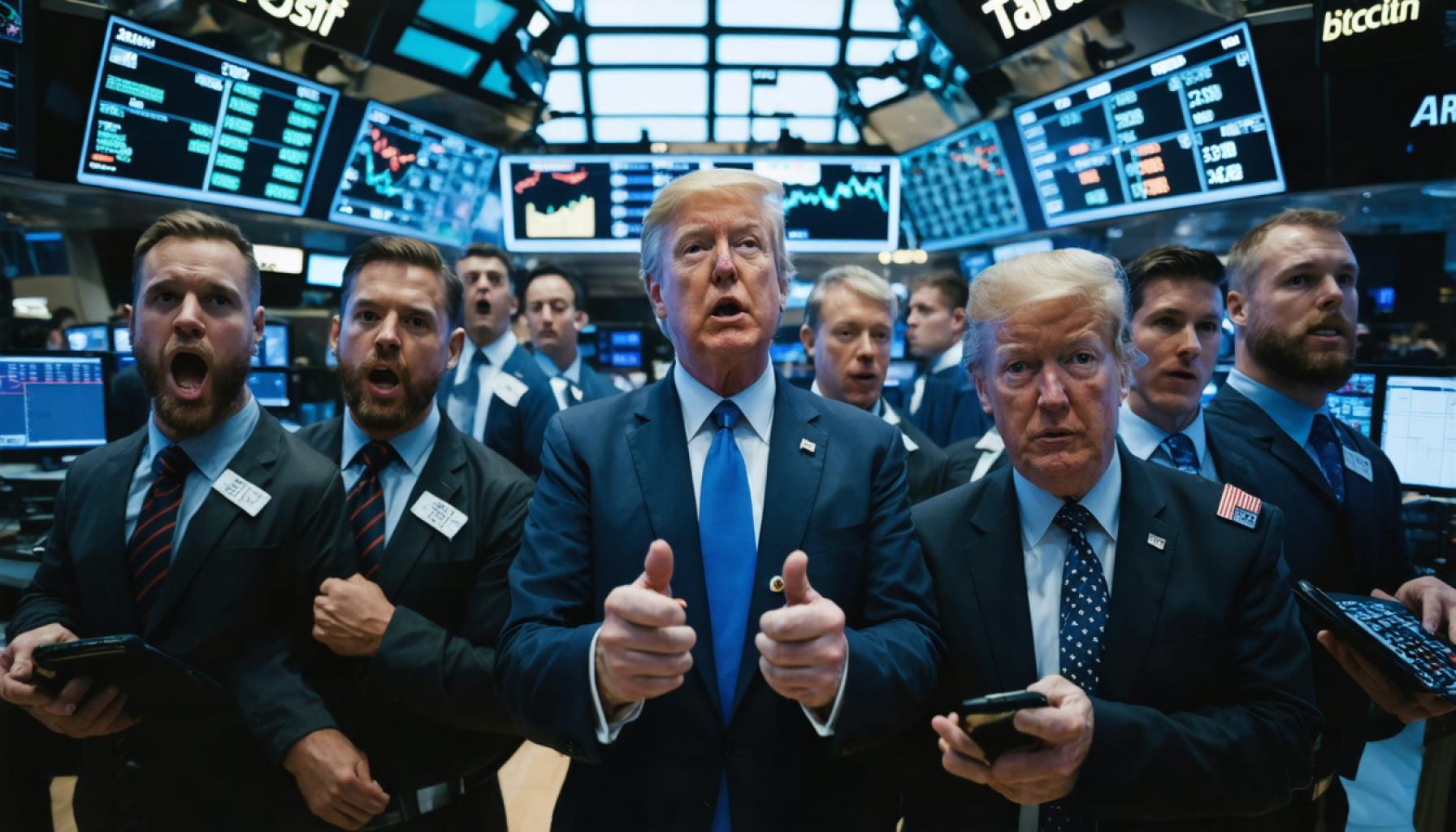- President Trump’s announcement of a 10% tariff on all imports has created significant financial market volatility.
- Predictions for a U.S. recession by 2025 have increased, with platforms like Polymarket and Kalshi suggesting a 54% probability.
- The stock market reacted negatively to the tariff news, yet Bitcoin remained stable, highlighting its role as “digital gold.”
- JPMorgan raised its recession probability to 40%, aligned with the growing concerns over new trade policies.
- Cryptocurrency and market speculation underscore the intertwined nature of economic policy and digital finance.
- The global economic landscape is uncertain, reflecting both the risks and opportunities of ongoing policy and market dynamics.
A dramatic shift captivates the economic landscape, instigated by a whirlwind of political maneuvers. Recent announcements have driven digital crystal balls to flicker anxiously, predicting unsettling economic prophecies. As President Donald Trump revealed his “Liberation Day” tariff plans, a seismic ripple traversed the financial world, leaving cryptocurrencies and market watchers sharp with anticipation.
The digital marketplace Polymarket, a hub for speculative thinkers, saw a dramatic increase in the odds of a U.S. recession by 2025. With a 54% likelihood now hanging ominously over the future, a significant rise from just 38% last week, bettors engage in a modern-day oracle ritual. Over a million dollars dance on the belief that the U.S. will face a downturn before the dawn of 2026 if recession criteria are met — either through a declared economic contraction or successive quarters of negative growth.
Ironically, this speculative cascade remains out of reach for U.S. residents due to intricate regulatory tapestries. Yet, elsewhere, platforms like Kalshi echo these sentiments, having surged from modest odds of 17% in early 2025 to match Polymarket’s 54%.
The financial terrain trembled in response to Trump’s broad 10% tariff on all imports, a proclamation that painted the stock market in shades of red. Yet, like a digital sphinx unfazed by earthly commotion, Bitcoin remained steady, its digital gold persona undeterred by Trump’s aggressive economic gambit.
JPMorgan joined this chorus of caution, citing a 40% chance of recession, a stark leap fueled by these new trade policies. Esteemed economist Justin Wolfers added his voice to the cacophony, suggesting that the odds for a 2025 recession had ballooned, alluding to its futile gestation.
As the smoke clears in this frenzied marketplace, one truth emerges: the interconnectedness of global economic and digital realms is undeniable. The swirling odds and numbers reflect a larger narrative — the tangible impact of policy and perception in an ever-digitalizing world. The question now isn’t just about when, or if, a recession will come, but how prepared we are to navigate its tumultuous waters. The future is uncertain, shimmering with equal parts peril and promise, waiting for the next move in this intricate economic chess game.
Economic Shockwaves: Are You Prepared for the 2025 Recession?
The Current Economic Scenario
The recent political and economic maneuvers have sent ripples through financial markets globally. The introduction of President Donald Trump’s “Liberation Day” tariff plans has heightened the specter of a U.S. recession, significantly raising the stakes in the predictive markets. The volatility in speculative platforms like Polymarket, which currently sees a 54% likelihood of a recession by 2025, underscores this uncertainty. Despite the regulatory limitations within the U.S., the sentiment is echoed on platforms like Kalshi, revealing a global concern over potential economic downturns.
Key Factors Influencing Economic Predictions
1. Tariff Impacts: The announced 10% tariff on all imports by Trump has triggered widespread concerns. Historical patterns suggest that increased tariffs can result in higher costs for businesses and consumers, potentially slowing economic growth.
2. Predictive Market Trends: Markets like Polymarket and Kalshi are offering insights into public sentiment and the probability of a recession. They serve as a modern-day barometer for economic forecasts, reflecting both the current and anticipated impact of political decisions.
3. Stable Cryptocurrencies: Interestingly, despite market upheavals, Bitcoin and other cryptocurrencies have shown resilience. This trend underscores the role of digital currencies as potential safe-haven assets amidst traditional market volatility.
4. Expert Opinions: Economists like Justin Wolfers highlight the increasing odds of a 2025 recession, pointing to confluence effects from tariffs and broader economic policies.
How-To Navigate Economic Uncertainty
– Diversify Investments: Spread investments across various asset classes. Consider a mix of equities, bonds, and alternative assets like real estate and cryptocurrencies, which may offer some stability.
– Stay Informed: Regularly review economic forecasts and expert analyses to stay ahead of market trends. Websites like Bloomberg and CNBC provide up-to-date financial news.
– Financial Planning: Ensure savings and emergency funds are robust to weather potential financial storms. Consulting financial advisors can offer personalized strategies tailored to individual risk appetites.
Market Forecasts & Industry Trends
– Cryptocurrencies: Expected to gain further traction as investors seek decentralized systems immune to policy shifts. Platforms facilitating trading, like Coinbase, will likely see increased activity.
– E-commerce and Technology: These sectors may continue to grow as digital behaviors rise amid economic uncertainties. Companies pivoting towards digital solutions and remote-friendly tools could benefit.
Pros and Cons Overview
– Pros:
– Opportunities in Volatility: Traders can potentially benefit from market fluctuations through strategic investments.
– Digital Currency Hedge: Cryptocurrencies may provide stability and growth potential amid volatile traditional markets.
– Cons:
– Regulatory Challenges: U.S. restrictions on trading platforms limit direct participation in speculative markets like Polymarket.
– Increased Costs: Tariffs could raise consumer prices, impacting disposable income and spending habits.
Actionable Recommendations
– Review Investments: Adjust portfolios to include assets with potentially lower correlation to traditional markets, such as precious metals or cryptocurrencies.
– Enhance Skillset: Consider acquiring skills in high-demand fields that are less vulnerable to economic downturns, like data science or cybersecurity.
– Monitor Economic Indicators: Keep an eye on unemployment rates, consumer spending, and GDP growth as indicators of economic health.
In conclusion, the global economic landscape is shifting dramatically in response to new policy announcements and market predictions. By staying informed and strategically managing investments, individuals can navigate these uncertain times more effectively.











